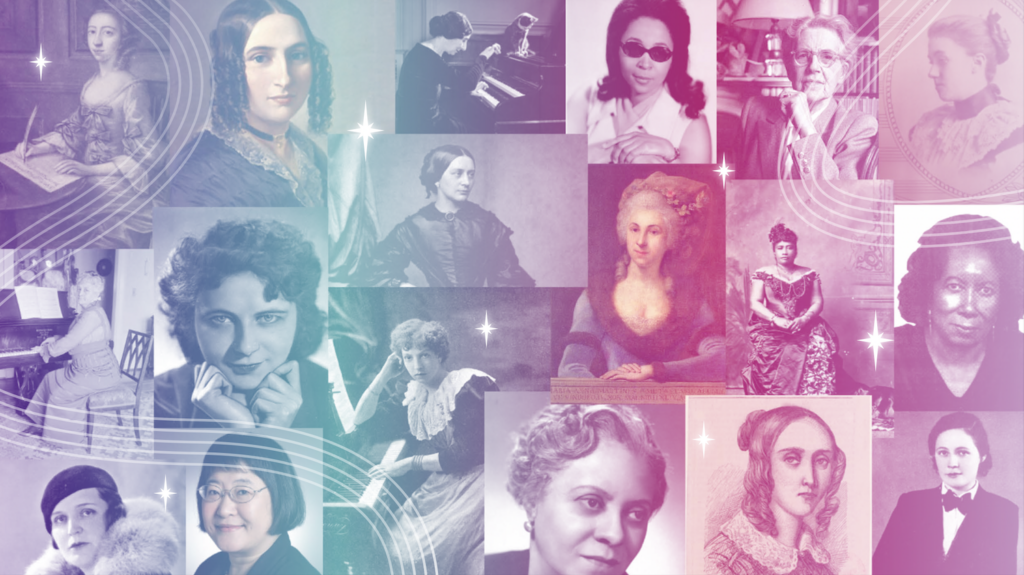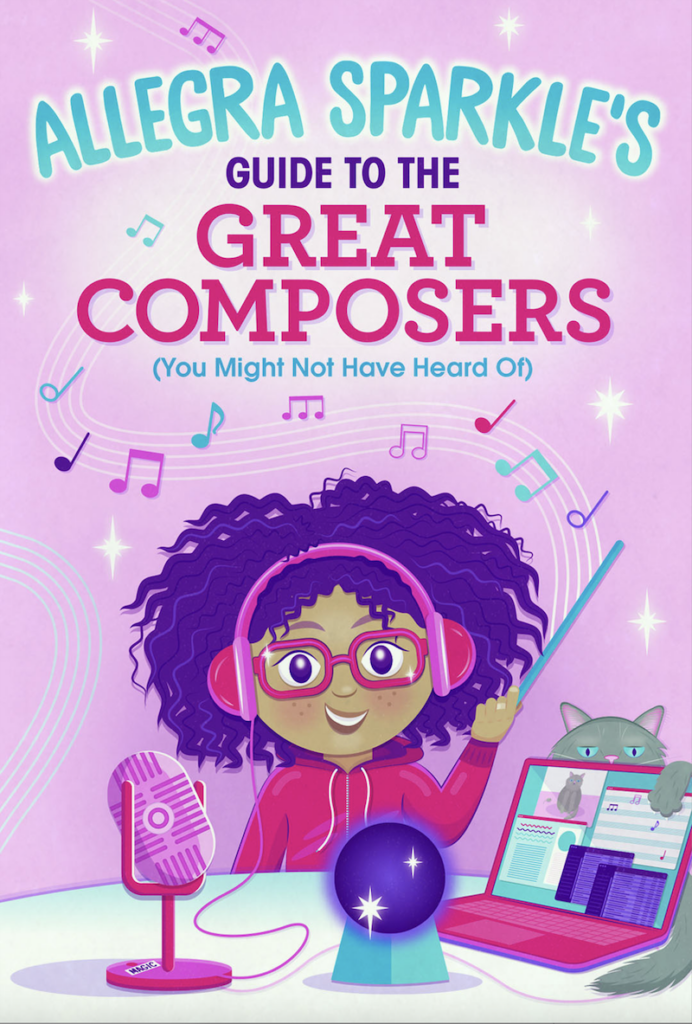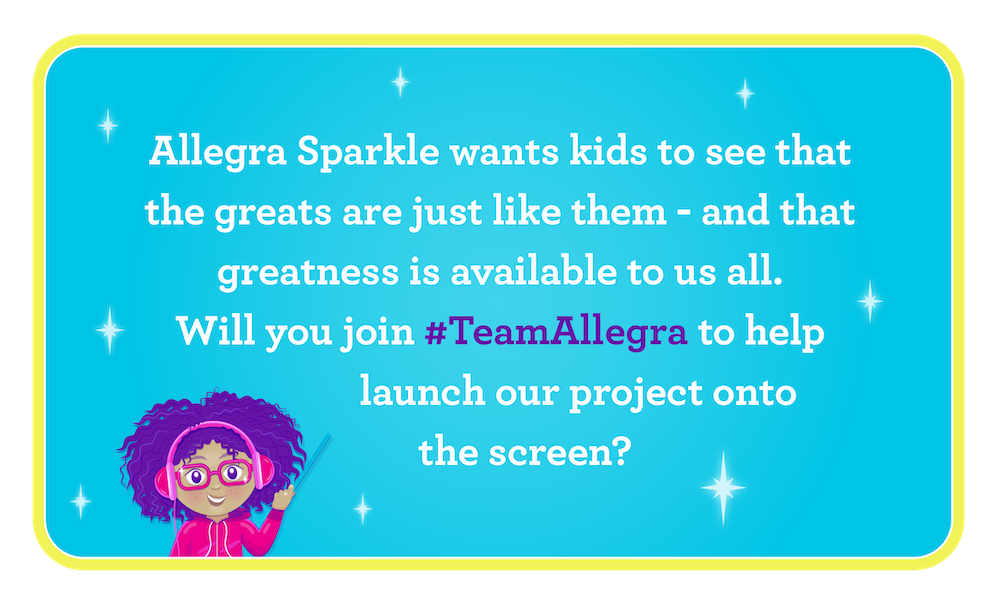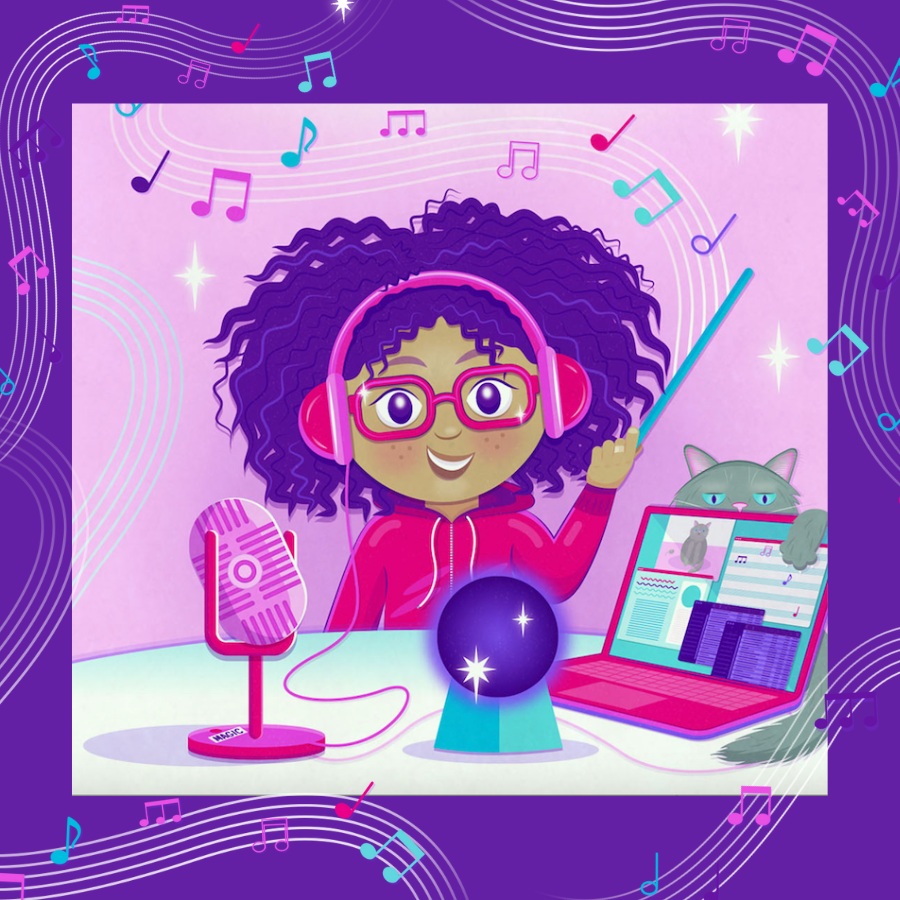Hi, friends! I’m Lillie Gardner, a writer and Feminist Book Club contributor. I’m also the creator of Allegra Sparkle’s Guide to the Great Composers (You Might Not Have Heard Of), an animated kids’ series that is super important to me as a classical pianist and music educator. Here’s why:
Why Classical Music?
For most of my childhood, playing piano was simply a thing I did because I was good at it. As I became more advanced, my music graduated from the Peanuts’ “Linus & Lucy” theme to pieces by composers like Bartók and Mozart. By age 10, I was transitioning from “learning how to play the piano” to “learning how to be a classical musician,” but I didn’t really understand what this meant. I practiced hard because I wanted to keep being good at the thing everybody knew I was good at. I never actually listened to classical music, like, for fun.
One day, my dad took my sister and me to Barnes & Noble, and I picked up a random CD by Beethoven. I was starting to gather this whole classical music thing was becoming part of my identity, and being the kind of person who buys (or, you know, has their dad buy) music by Beethoven seemed like my brand. (Why, yes, I do have a parent who works in advertising!)
That night, camped out on the living room floor for a sleepover, I slipped the CD into my neon blue Walkman. I listened. It was Beethoven’s “Eroica” Symphony, and it was the most beautiful, uplifting, and exciting music I had ever heard. I felt chills. The door to classical music was opened. I realized the work I did at the piano was about more than being good at something. Music-making was artistic, spiritual, necessary. And I wanted to explore the whole world of it.
From that point forward, I loved every brilliant work by Beethoven, Chopin, Prokofiev, and the other composers I learned and performed throughout my musical upbringing. I spent hours studying Haydn concertos and Bach fugues, practiced Debussy late into the night, woke up early to memorize Liszt. I loved every piece I studied. I went to music school for college, where I kept doing the same thing.
It never once occurred to me that it was strange how every single piece of music I loved was written by a man.
When I was in graduate school at NYU, my chamber music trio decided to perform a “love triangle” concert with piano trio movements by Johannes Brahms, Robert Schumann, and Clara Schumann. I got all the musical scores I needed from the library. This all felt very “business as usual” until I started learning the notes to the “Andante” movement from Clara Schumann’s Piano Trio in G minor. It was late at night. I was in a chilly practice room by Washington Square Park, and I was bundled up because a window to the cold outside was stuck open. I wrote a few fingerings on the page for the opening notes, played through the opening measures, and a simple but stunning realization settled over me:
A woman wrote this.
I was so moved by this fact that I picked up the phone to call my sister. How many times had I started learning the notes to a piece in my 15+ years of playing the piano? How had none of those notes been composed by a woman until now?
I don’t know if it was just the chill of that cold New York City air, but learning the first page of Clara Schumann’s piano trio felt akin to a religious experience. The music had me in tears. I had not made it through my classical music youth and early adulthood without a wide range of sexist experiences, and suddenly I felt like I was communing with a composer who might understand me better than any I had studied before.
And how f-ing beautiful is this piece? Do you not want to start crying when the violin line starts?
Women Composers #1 Fan
When I started learning Clara Schumann’s piano trio, I felt the same chills as when I first listened to Beethoven’s “Eroica” Symphony. My idea of what the classical music landscape consisted of was suddenly blown up. This world was far bigger than I had ever considered.

Over the next few years, I realized there are not just a few women composers who’ve been forgotten about, but thousands of them. I became fascinated by women composers’ lives and music. As a pianist, I was thrilled to discover there were so many pieces of music that were entirely new to me. As a historian, I was obsessed with learning about how each of these women worked within or against the patriarchal restrictions of their time and place. And now, as a piano teacher to kids, I’ve become passionate about including works by women composers in their education in an effort to normalize female genius.
It’s as simple as this: sometimes when I’m teaching kids, we refer to a composer as “she.” This is an experience I never had as a kid. I believe the normal use of this simple word is crucial to combating sexism in the music world and beyond.
And Allegra Sparkle Was Born!
My passions for historical women composers, screenwriting, and kids’ education led me to write Allegra Sparkle’s Guide to the Great Composers (You Might Not Have Heard Of), a super fun animated TV series for kids. In each episode, an imaginative 10-year-old composer leads a magical podcast journey throughout history and around the world to meet composers who got left out of the classical music canon. The composers featured are mostly women, but any underrepresented composer could show up.
Allegra Sparkle offers an inclusive and entertaining history of classical music that doesn’t exist anywhere else. The mission of the series is the belief that the canon of greatness does not have to be so narrow and small. Allegra wants kids to see that the greats are just like them, and that greatness is available to us all.
I’m a big believer in the idea that we cannot have a more inclusive and just future if we don’t first have an accurate understanding of our own past, which at no point consisted of exclusively male genius. Women composers have been around for just as long as men composers, but their stories are not included anywhere. Don’t you think we should change that?

So far, my script has been successful in the world of screenwriting competitions (including being a Semifinalist in Austin Film Festival’s Script Competition and in the Rooster Teeth Women & Animation Fellowship!). My illustrator sister Jane Gardner created the concept art, and we’re about to create a high-quality pitch video with more art and animation to help us launch this project into the world.
Join #TeamAllegra
We are currently running a 30-day crowdfunding campaign on Seed&Spark to fund Allegra Sparkle‘s next steps in the world. I believe a series like this is long overdue, and I’m determined to get it made no matter what.
Check out our campaign page at seedandspark.com/fund/allegrasparkle, where you can learn more about the series and watch my meta pitch-video-for-a-pitch-video. Contribute to the campaign if you can, and please share widely!
We have exciting incentives that include everything from digital women composers flashcards to personalized YouTube playlists (these are my favorite to make!) to physical art to… (drumroll please) …$100 gift cards to Feminist Book Club!
But since you’ve already read to the end of this post, here’s a sneak peek of what’s on some of the women composers flashcards, including music in case these pieces are new to you, too:
Nobu Koda (Japanese, 1870-1946)
Fun fact: She taught Shinichi Suzuki, who became famous for the “Suzuki” method of music teaching.
Notable piece: Violin Sonata No. 1 in E-flat major (1895)
Margaret Bonds (American, 1913-1972)
Fun fact: She wrote her first composition, “Marquette Street Blues,” when she was only 5 years old, and she frequently collaborated with poet Langston Hughes.
Notable piece: Troubled Water (ca. 1940)
Chiquinha Gonzaga (Brazilian, 1846-1935)
Fun fact: She was good friends with Nair de Tefé von Hoonholtz, the world’s first woman cartoonist!
Notable piece: ô Abre Alas! (1899)
Louise Farrenc (French, 1804-1875)
Fun fact: After seven years of being paid less than her male counterparts when she was a Professor of Piano at the Paris Conservatory, she demanded equal pay — and received it.
Notable piece: Nonet in E-flat Major, Op. 38 (1849)

Please join us over at Seed&Spark and share this project widely to help us smash the patriarchy by creating inclusive, fun, and accurate historical content to fuel a better future. (And did I mention there are $100 Feminist Book Club gift cards?!)
The thing is, Beethoven will always be near and dear to my heart, but wouldn’t it be cool if the next kid to discover their love for classical music found it through a Florence Price symphony? Imagine how much bigger their worldview would be compared to how limited mine was as a kid. That’s the future I want to live in, and I hope you’ll join me in making it happen.


